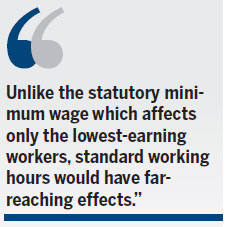Working hours could harm workers and employers
Updated: 2013-10-18 08:38
(HK Edition)
|
|||||||||
The proposal to set standard working hours to protect workers from exploitation carries a significant impact, according to Adeline Wong, chief executive officer of the Chinese Manufacturers' Association (CMA). She says she's concerned if standard working hours came under statutory regulation there would be multiple effects on employees and their employers.
Employers would be hit with higher operating costs if they were required by law to pay for overtime work. It would mean higher costs, which would have to be passed on to customers. The price of goods and services would rise. Ultimately the public would pay the price.
To avoid overtime pay, employers may cut working hours. They may instead hire more part-time staff and the employees will earn less. Furthermore, small companies may not survive if they cannot cope with the rising cost of business.
"The business community, including the CMA, sees no need to legislate for standard working hours. Unlike the statutory minimum wage which affects only the lowest-earning workers, standard working hours would have far-reaching effects," she said.

"The Standard Working Hours Committee should undertake detailed studies to determine where standard working hours are prevalent, the reasons why and whether requiring employees to put in unpaid overtime is common practice. The government should also carry out public consultation on the matter."
There are two types of standard working hours, she points out.
The first type is a prescribed number of working hours commonly known as "maximum working hours" - under which overtime work (with or without pay) is not permitted.
The second type allows overtime work with pay.
"I wonder what they really want," she questioned. "If they want work-life balance, occupational safety or more time with their family, it will be maximum working hours. But it appears not to be the case as they demand overtime pay at 1.5 times of normal wage."
She also worries that standard working hours will not improve labor relations. Some employers may be very caring but if they are placed under law, the employers will be more likely to keep a close check on workers and keep attendance records.
"If the relations are good, female employees who have children may go home earlier even if they haven't finished their work because they can do the work at home with computers," she said. "Yet such good relation may be lost if the law is made."
She urges the government to define the policy objective if it legislates for working hours.
"What does the government want - occupational safety, work-life balance or job creation? When South Korea enacted such law in 1998, it had a clear objective of creating more job opportunities," she observed.
Contact the writer at joseph@chinadailyhk.com
|
The business community stands firmly against legislation for standard working hours. |
(HK Edition 10/18/2013 page8)
